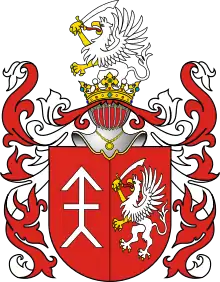Jan Hieronimowicz Chodkiewicz
Jan Hieronimowicz Chodkiewicz (Lithuanian: Jonas Chodkevičius, Belarusian: Ян Геранімавіч Хадкевіч) (1537 – 4 August 1579) was a 16th-century Polish-Lithuanian noble. He was Grand Pantler of Lithuania 1559, general starost of Samogitia 1563, Elder of Samogitia 1564, starost of Telšiai and Plateliai 1566, Livonia Hetman and governor, Grand Marshal of Lithuania 1566, Kaunas starost 1569, Count on Shkloŭ 1568, Vilnius castellan 1574.
Jan Chodkiewicz | |
|---|---|
| Governor of Livonia | |
| Coat of arms |  Kościesza odm. Chodkiewicz Kościesza odm. Chodkiewicz |
| Tenure | 1566–1578 |
| Born | 1537 |
| Died | 4 August 1579 (aged 42) Vilnius |
| Buried | Vilnius Cathedral |
| Family | Chodkiewicz |
| Consort | Krystyna Zborowska h. Jastrzębiec |
| Issue | Aleksander Jan Karol Hieronim Zofia Drohostajska Anna, Princess Joachim Korecki Aleksandara, Princess Adam Wiśniowiecki Elżbieta, Princess Jan Żyliński |
| Father | Hieronim Chodkiewicz h. Kościesza |
| Mother | Anna Szemetówna h. Łabędź |
Biography
He was one of the most famous Polish-Lithuanian magnates of the 16th century. Raised a Calvinist he studied at the Universities of Königsberg, Leipzig, and Wittenberg, and entered in the service of Emperor Charles V from 1552 to 1555. After that he entered the service of the Grand Duke of Lithuania. In 1558 Jan Chodkiewicz was made Livonia Hetman and sent to defend Livonia against Tsar Ivan IV 'the Terrible' who was trying to enforce a passage to the Baltic Sea. With the help of Michael Radziwiłł, Great Chancellor of Lithuania, he succeeded in attaching Livonia to Lithuania. But this territory remained for long the main target of Russian attacks. In 1564 he became Elder of Samogitia, in 1566 Grand Marshal of Lithuania and governor of Livonia (1566–78, with headquarter at Sigulda near Riga), and in 1574 Castellan of Vilnius.
As his uncle he was a strong opponent to the Union of Lithuania with Poland. The Lithuanian delegation to the meetings preparing the Act of Union between Poland and Lithuania was led by Jan, who insisted in a long impassioned speech on the equality and independence of the two nations. Finally "bowing to the king's power, he pointed out those parts of the Act of Union which were unacceptable to Lithuania and he stated that he yielded to the King's will only with the deepest sorrow".[1] In practice the Union of Lublin in 1589 made sure that the Grand Duchy of Lithuania retained its own form of government and separate laws until the end of the joint state in 1795.
In 1570 Jan Hieronimowicz converted to Catholicism and became a great benefactor of the Jesuits.
He married the Calvinist Krystyna Zborowska before 1559 in Krakow, daughter of Marcin Zborowski, castellan of Krakow, and Anna Konarska. She remained Calvinist despite his conversion and raised some of their daughters in that religion despite their father's will.
They had issue: Hieronim was born at Vilnius in 1559; Aleksander at Trakai in 1560; Jan Karol at Vilnius in 1560–61; Anna at Vilnius in 1562; Zofia at Vilnius in 1564, Elzbieta at Vilnius in 1568; and Aleksandra at Vilnius in 1576.
He died on 4 August 1579 and was buried in Vilnius Cathedral.
Marriage and issue
Jan Hieronim married Krystyna Zborowska h. Jastrzębiec (c. 1540–1588), daughter of Marcin Zborowski h. Jastrzębiec and Anna Konarska h. Abdank, the daughter of Stanisław Konarski h. Abdank and Zofia Lanckorońska h. Zadora, in 1559, and had seven children:[2]
- Aleksander Chodkiewicz (1560-1626), voivode of Troki, married Eufemia Sienieńska h. Dębno, the daughter of voivode of Podole Jan Sienieński h. Dębno and Katarzyna Korniakt h. Krucyni, the daughter of Konstanty Korniakt h. Krucyni
- Jan Karol Chodkiewicz (1561-1621), voivode of Wilno and Hetman, married Zofia Mielecka h. Gryf, the daughter of voivode of Podole and Hetman Mikołaj Mielecki h. Gryf and Princess Elżbieta Radziwiłł h. Trąby. His second wife was Princess Anna Alojza Ostrogska h. Ostrogski, the daughter of voivode of Wołyń Prince Aleksander Ostrogski h. Ostrogski and Anna Kostka h. Dąbrowa
- Hieronim Chodkiewicz (died 1576), unmarried
- Zofia Chodkiewicz (died 1576), married Grand Marshal of Lithuania Krzysztof Drohostajski h. Leliwa
- Anna Chodkiewicz (died 1626), married Prince Joachim Korecki h. Pogoń Litewska
- Aleksandara Chodkiewicz, married Prince Adam Wiśniowiecki h. Korybut
- Elżbieta Chodkiewicz, married Prince Jan Żyliński and castelan of Navahrudak Samuel Wołłowicz h. Bogorya
Ancestry
| Anna of Riazan | Fyodor Bielski | Chodko Jurewicz | |||||||||||||||||||||||||||||||||||||||||||||||
| Jarosław Hołwczyński | Jawnuta Bielska | Ivan Chodkiewicz | |||||||||||||||||||||||||||||||||||||||||||||||
| Elzbieta Hlebowiczówna | Melchior Szemet | Wasylissa Hołowczyńska | Aleksander Chodkiewicz | ||||||||||||||||||||||||||||||||||||||||||||||
| Anna Szemetówna | Hieronim Chodkiewicz | ||||||||||||||||||||||||||||||||||||||||||||||||
| Jan Hieronimowicz Chodkiewicz | |||||||||||||||||||||||||||||||||||||||||||||||||

Sources
Danuta Bogdan, Students of the Republic at the University of Königsberg, in Królewice and Poland, Olsztyn 1993, p 82.
Leszek Kieniewicz the Senate for the Stefan Batory Foundation, Warsaw 2000, p 299.
Joseph Janowski: Jan Chodkiewicz Hieronimowicz. In: Polish Biographical Dictionary . T. 3: Brozek Jan – Chwalczewski Francis. Cracow : Polish Academy of Learning – Main Ingredients in bookstores Gebethner and Wolff, 1937, pp. 361–363. Reprint: Department of National Theatre. Ossolińskich, Kraków 1989, ISBN 8304032910.
References
- Encyclopedia Lithuanica
- "Krystyna Zborowska ze Zborowa h. Jastrzębiec".